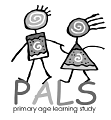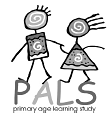What makes Parenting Programmes Work in Disadvantaged Areas? (The PALS Trial)

 Ensuring that a child is brought up experiencing warmth, love and encouragement within safe boundaries is far harder for parents who live in the stressful conditions found in poor neighbourhoods. Children raised in poverty do less well than children raised in more favourable circumstances on a range of measures of attainment and quality of life. Yet, if the emotional quality of a child?s upbringing is good, then the evidence is clear that children can succeed despite starting in less favourable conditions. This report describes an evaluation of what factors make an intervention effective in helping parents in one of the poorest parts of Britain give their children a better start in life.
Ensuring that a child is brought up experiencing warmth, love and encouragement within safe boundaries is far harder for parents who live in the stressful conditions found in poor neighbourhoods. Children raised in poverty do less well than children raised in more favourable circumstances on a range of measures of attainment and quality of life. Yet, if the emotional quality of a child?s upbringing is good, then the evidence is clear that children can succeed despite starting in less favourable conditions. This report describes an evaluation of what factors make an intervention effective in helping parents in one of the poorest parts of Britain give their children a better start in life.
This study investigated the factors that affect the impact of an intervention programme for parents of five and six year olds, and was called the Primary Age Learning Study (PALS). The aims of this study continue the tradition of other studies published by the Joseph Rowntree Foundation (JRF) on related topics, including recently Routes out of Poverty: A Research Review (Kemp et al. , 2004), Migration and Mobility: The Life Chances of Britain?s Minority Ethnic Communities (Platt, 2005) and Anti-social Behaviour Strategies: Finding a Balance (Millie et al. , 2005). However, while most JRF studies are observational, this study is one of the few that is an evaluation of an intervention; for example, it follows the evaluation of three ?Communities that Care? demonstration projects (Crow et al ., 2004). It is only the second we know of that is a randomised controlled trial, which is by far the surest way to determine effectiveness; the other was the study of the outcomes and costs of Home-Start support for young families under stress (McAuley et al. , 2004). The support given in Home-Start was very well received by parents, although it did not show any impact on parenting or child outcomes during the time period of the study.
Recent Post
Posts by Tag
- Research Library (315)
- Program (298)
- Key (296)
- Audience (290)
- All (265)
- Parent Training (257)
- Agencies & Admin (202)
- Treatment (188)
- Prevention (148)
- Implementation and Dissemination (106)
- Therapists and Group Leaders (106)
- Implementation and Dissemination (88)
- Parents (63)
- Independent Replication (60)
- Teacher Training (54)
- Child Training (46)
- Assessment (41)
- Skill Development (39)
- Assessment (38)
- Independent Replication (38)
- Teachers (36)
- treatment (36)
- Therapists and Group Leaders (34)
- RCT (30)
- Review (28)
- review (28)
- Teacher Training (26)
- evidence-based (26)
- Prevention (21)
- At risk (19)
- Books (17)
- child training (17)
- Parenting Program (15)
- Programs (14)
- Implementation (13)
- Randomized control trial (13)
- Parenting (12)
- behavior problems (11)
- Autism (10)
- Social Emotional Learning (10)
- randomized control group trial (10)
- ADHD (9)
- Incredible Years (9)
- Preschoolers (9)
- Classroom (8)
- Key (8)
- conduct problems (8)
- intervention (8)
- Fidelity (7)
- Early Intervention (6)
- News (6)
- child development (6)
- Parenting Intervention (5)
- Program (5)
- Self-regulation (5)
- Universal (5)
- conduct disorder (5)
- consultation (5)
- goals (5)
- meta-analysis (5)
- objectives (5)
- parent training program (5)
- theoretical foundation (5)
- Baby Program (4)
- Child behavior (4)
- Classroom Dinosaur (4)
- School (4)
- Behavioral Health (3)
- Filipino (3)
- High-risk (3)
- News (3)
- Social competence (3)
- child protective services (3)
- cost effectiveness (3)
- cultural adaptation (3)
- dissemination (3)
- effectiveness (3)
- emotion regulation (3)
- parent involvement (3)
- parent-teacher relations (3)
- positive behavior management (3)
- teacher perception (3)
- trauma (3)
- Aggressive Behavior (2)
- Basic Parent Program (2)
- CPS (2)
- Children (2)
- Developmental Disability (2)
- Disruptive behavior (2)
- Early childhood (2)
- Feasibility (2)
- Home Coaching (2)
- Hyperactivity (2)
- Infant (2)
- International (2)
- Mental Health (2)
- Parent Home Coaching (2)
- Research (2)
- STARS (2)
- STEER (2)
- School readiness (2)
- TCM (2)
- behavioral difficulties (2)
- behavioral problems (2)
- child behavior problems (2)
- child maltreatment (2)
- classroom intervention (2)
- collaborative (2)
- culturally tailored (2)
- economically disadvantaged (2)
- emotional difficulties (2)
- foster care (2)
- group based (2)
- mediation (2)
- residential care (2)
- review of literature (2)
- school aged (2)
- social and emotional competence (2)
- sustainability (2)
- teacher change (2)
- Attentive Parenting (1)
- Behavior Management (1)
- Caregivers (1)
- Child Welfare (1)
- Child–teacher relationship (1)
- Coping (1)
- Denmark (1)
- Evidence-Based Practices (1)
- Families (1)
- Family (1)
- Flying Start (1)
- Foucault (1)
- Gipuzkoa (1)
- Hmong (1)
- Home learning environment (1)
- IY TCM (1)
- Implantación (1)
- Innovation (1)
- Kindergarten (1)
- Māori (1)
- News (1)
- ODD (1)
- Parent stress (1)
- Parenting interventions (1)
- Preschool Children (1)
- Programas basados en la evidencia (1)
- Protección infantil (1)
- Public Health (1)
- Rural schools (1)
- Scaling up (1)
- Small Group Treatment (1)
- Social-emotional well being (1)
- Spain (1)
- Sure Start (1)
- Time Out (1)
- Toddler parenting Program (1)
- Trauma-informed (1)
- Wales (1)
- abuse (1)
- academic achievement (1)
- academic competence (1)
- academic problems (1)
- activity (1)
- age effects (1)
- attachment (1)
- attendance (1)
- behavior regulation (1)
- behavioral intervention (1)
- behavioral interventions (1)
- central nervous system (1)
- child behavior program (1)
- child care (1)
- child experience (1)
- child program (1)
- child training program (1)
- childcare (1)
- childhood (1)
- childhood conduct problems (1)
- classroom conduct (1)
- clinically significant improvement (1)
- collaborating (1)
- collaborative processes (1)
- content (1)
- cost-effective (1)
- costing (1)
- cultural adaptations (1)
- cultural responsiveness (1)
- early education (1)
- economic disadvantage (1)
- education (1)
- elementary (1)
- elementary school (1)
- emotional development (1)
- emotional health (1)
- emotional problems (1)
- engagement (1)
- evaluation (1)
- evidence-based parenting group (1)
- externalizing (1)
- externalizing behavior (1)
- fidélité (1)
- health (1)
- health disparities (1)
- healthy life style (1)
- home parent support (1)
- home visiting (1)
- home-based (1)
- implantation (1)
- independent research (1)
- independent review (1)
- internalizing (1)
- interpersonal competence (1)
- language delays (1)
- language development (1)
- latent transition analysis (1)
- malnutrition (1)
- maltreatment (1)
- maternal depression (1)
- mental health care (1)
- methods (1)
- neglect (1)
- nutrition (1)
- obesity (1)
- oppositional defiant disorder (1)
- parent perception (1)
- parent practices (1)
- participation (1)
- peer problems (1)
- pilot (1)
- post-colonisation (1)
- post-structuralism (1)
- primary care (1)
- primary school (1)
- problem solving (1)
- processes (1)
- professional development (1)
- program evaluation (1)
- prosocial behavior (1)
- qualitative analysis (1)
- rationale (1)
- residential child care (1)
- satisfaction (1)
- scaling (1)
- self-efficacy (1)
- single parents (1)
- social behavior (1)
- social communication (1)
- social development (1)
- social problem solving (1)
- socioemotional and behavioural difficulties (1)
- special educational needs (1)
- staff training (1)
- stress (1)
- student outcomes (1)
- student-teacher relationship (1)
- teacher behaviour (1)
- teacher self-efficacy (1)
- teacher stress (1)
- teacher wellbeing (1)
- therapist (1)
- therapists (1)
- therapy (1)
- transportability (1)
- video-based modeling (1)
- well-being (1)




